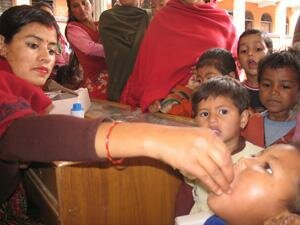Nepal Women Vital to Healthcare
Female healthcare workers provide a vital service for the poorest in mountainous Nepal.
 Women working as healthcare volunteers in Nepal, have contributed to a steady improvement in maternal and neonatal survival rates.
Women working as healthcare volunteers in Nepal, have contributed to a steady improvement in maternal and neonatal survival rates.
“Without their volunteer spirit, the country’s poorest would probably face an even worse health situation,” said community health activist Deepa Bohara in Rakam Karnali village, Dailekh District, 600km northwest of Kathmandu.
Female community health volunteers (FCHVs) operate in remote areas where there are no doctors or medical workers; there are 810 of them in Dailekh District, and 52,000 nationwide.
Dailekh Hospital, the mid-western region’s main government health centre, often relies on information provided by FCHVs who help record and collect data on women’s and children’s health.
“They are often seen as doctors in the remote villages… They are… constantly in touch with the poorest women who often have difficulty making long journeys to the hospitals,” hospital director Jung Shah told IRIN.
While FCHVs cannot handle medical complications, “they play a key role in making referrals and persuading the pregnant and young mothers to visit health centres, as well as providing basic information about child care, and that makes a huge difference,” said Shah.
FCHVs also help collect funds from local communities to enable the sick to reach hospital.
Progress on maternal mortality
Nepal is one of 10 developing countries to have slashed its maternal mortality ratio (MMR) by at least 75 percent between 1990 and 2010. An estimated 170 women died in 2010 for every 100,000 live births. The estimate ranges from 100 to 290 deaths. In 1990, the estimated MMR was 770 deaths per 100,000 live births. Many believe the FCHVs are playing a key role in this.
“It’s difficult to say accurately what percentage of lives they are saving but we are confident that without the FCHVs, the maternal health and child health [situation] would have been worse,” said family planning officer Ram Krishna Phuyal, from the Department of Education, where he oversees the FCHV programme within Kathmandu District.
According to the country’s most recent (2011) Demographic Health Survey, the proportion of babies attended by skilled providers nearly doubled between 2006 and 2011, from 19 percent to 36 percent, while the proportion of babies delivered in a health facility increased from 18 to 28 percent during the same period.
Under the Millennium Development Goal programme, Nepal is aiming to ensure that 60 percent of women giving birth have trained birth attendants by 2015.
Respect
The FCHV programme was launched in 1988 in 19 districts in the mid-west (Nepal’s poorest region), with the purpose of improving maternal and neonatal care, according to the Health Ministry.
More than half of the volunteers have been working for more than a decade. Despite being regarded as key to the state’s public health programme, the government provides them with virtually no support.
“I have given up expecting any benefits from the government, but it is our commitment to our communities that keeps us motivated and energetic,” said 35-year-old FCHV Sitala Majhi, in Rakam Karnali village.
Majhi finished 10 years of schooling a decade ago, but could not find paid employment. She started visiting local households, especially those with new mothers and young children, to discuss ways of preventing diarrhoea and other diseases. “During the monsoon and summer, more children and women get sick as most of them suffer from diarrhoea. It is my job to provide necessary information on sanitation and necessary medicines,” said Majhi.
Health Ministry officials in Kathmandu say they are trying their best to earmark more resources for FCHVs, but face budgetary constraints.
FCHVs receive about four health training sessions per year, when they are paid US$3 towards transport costs, and $50 for a uniform.
FCHVs say community respect, and freedom to get out of the house, helps motivate them. “It is a pride to be an FCHV because everywhere I go the local community gives me the respect that I never had. I think none of us want to miss [out on] that,” said Durga Joshi, 68, who has been an FCHV for 15 years in Nakhu just outside Kathmandu.
Source: IRIN

















